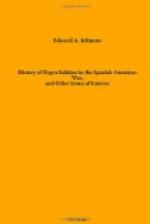The Atlanta Journal says:
A HAPPY RIDDANCE.
The army and the country are to be congratulated on the mustering out of the Third North Carolina Regiment.
A tougher and more turbulent set of Negroes were probably never gotten together before. Wherever this regiment went it caused trouble.
While stationed in Macon several of its members were killed, either by their own comrades in drunken brawls or by citizens in self-defense.
Last night the mustered-out regiment passed through Atlanta on its way home and during its brief stay here exhibited the same ruffianism and brutality that characterized it while in the service. But for the promptness and pluck of several Atlanta policemen these Negro ex-soldiers would have done serious mischief at the depot. Those who undertook to make trouble were very promptly clubbed into submission, and one fellow more obstreperous than the rest, was lodged in the station house.
With the exception of two or three regiments the Negro volunteers in the recent war were worse than useless. The Negro regulars, on the contrary, made a fine record, both for fighting and conduct in camp.
[Illustration: THIRD NORTH CAROLINA VOLUNTEERS AND OFFICERS.]
The mustering out of the Negro volunteers should have begun sooner and have been completed long ago.
* * * * *
WHAT PRESIDENT CHARLES FRANCIS MESERVE SAYS.
President Charles Francis Meserve, of Shaw University, says:
“I spent a part of two days the latter part of December at Camp Haskell, near Macon, Ga., inspecting the Third North Carolina colored regiment and its camp and surroundings. The fact that this regiment has colored officers and the knowledge that the Colonel and quite a number of officers, as well as many of the rank and file, were graduates or former students of Shaw University, led me to make a visit to this regiment, unheralded and unannounced. I was just crossing the line into the camp when I was stopped by a guard, who wanted to know who I was and what I wanted. I told him I was a very small piece of Shaw University, and that I wanted to see Col. Young. After that sentence was uttered, and he had directed me to the headquarters of the colonel, the regiment and the camp might have been called mine, for the freedom of everything was granted me.”
The camp is admirably located on a sandy hillside, near pine woods, and is dry and well-drained. It is well laid out, with a broad avenue in the centre intersected by a number of side streets. On one side of the avenue are the tents and quarters of the men and the canteen, and on the opposite side the officers’ quarters, the hospital, the quartermasters stores, the Y.M.C.A. tent, etc.




